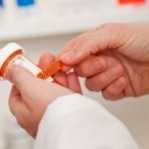FDA changes painkiller labels to warn expectant mothers, after 2,500% growth in number of Ky. babies born addicted to drugs

The U.S. Food and Drug Administration (FDA) announced Tuesday drug-safety labeling changes and new post-market study requirements for all extended-release and long-acting opioids, and Kentucky political leaders applauded these measures to curb prescription drug abuse.
Long-acting opioids are intended to treat pain but may also lead to drug abuse, dependence or other complications if taken during pregnancy or misused. Now, as part of new FDA safety measures, the boxed warning labels on these drugs will warn expectant mothers that “the use of the products during pregnancy can result in neonatal opioid withdrawal syndrome (NOWS),” says the FDA release.
NOWS is among a group of problems called Neonatal Abstinence Syndrome (NAS) that occur in a newborn exposed to addictive drugs while in the mother’s womb. The baby’s addiction can lead to birth defects, low birth weight, sudden infant death syndrome and other health conditions.
Attorney General Jack Conway and his counterparts in other states asked the FDA to act after several states reported an increase in the number of babies born addicted to prescription drugs. In Kentucky, “Instances of NAS have risen 2,500 percent over the past decade – from 29 incidents in 2001 to 730 in 2011,” says a Conway release.
“I applaud the FDA for making this change that will better alert physicians and patients about the dangerous consequences of using these powerful prescription painkillers during pregnancy,” Conway said. Also as part of these safety labeling changes, certain educational materials for patients and health care professionals will be modified to reflect the new labeling.
U.S. Senate Republican Leader Mitch McConnell also praised the FDA’s decision, saying it is a positive step forward in the fight against the state’s prescription drug abuse problem.
Because little is known about the risks of long-term use of long-acting opioids, the FDA is also requiring the drug companies that make these products to conduct further studies and clinical trials to assess the known serious risks of misuse, abuse, increased sensitivity to pain (hyperalgesia), addiction, overdose and death, says the FDA.
“Altogether, the actions we’re now announcing are part of FDA’s efforts to make opioids as safe as possible for those who need them,” said Dr. Douglas Throckmorton, deputy director of regulatory programs in FDA’s Center for Drug Evaluation and Research. “This is not the first or last initiative, and we will continue supporting broader efforts to solve the serious public health problems associated with the misuse and abuse of opioids.”
